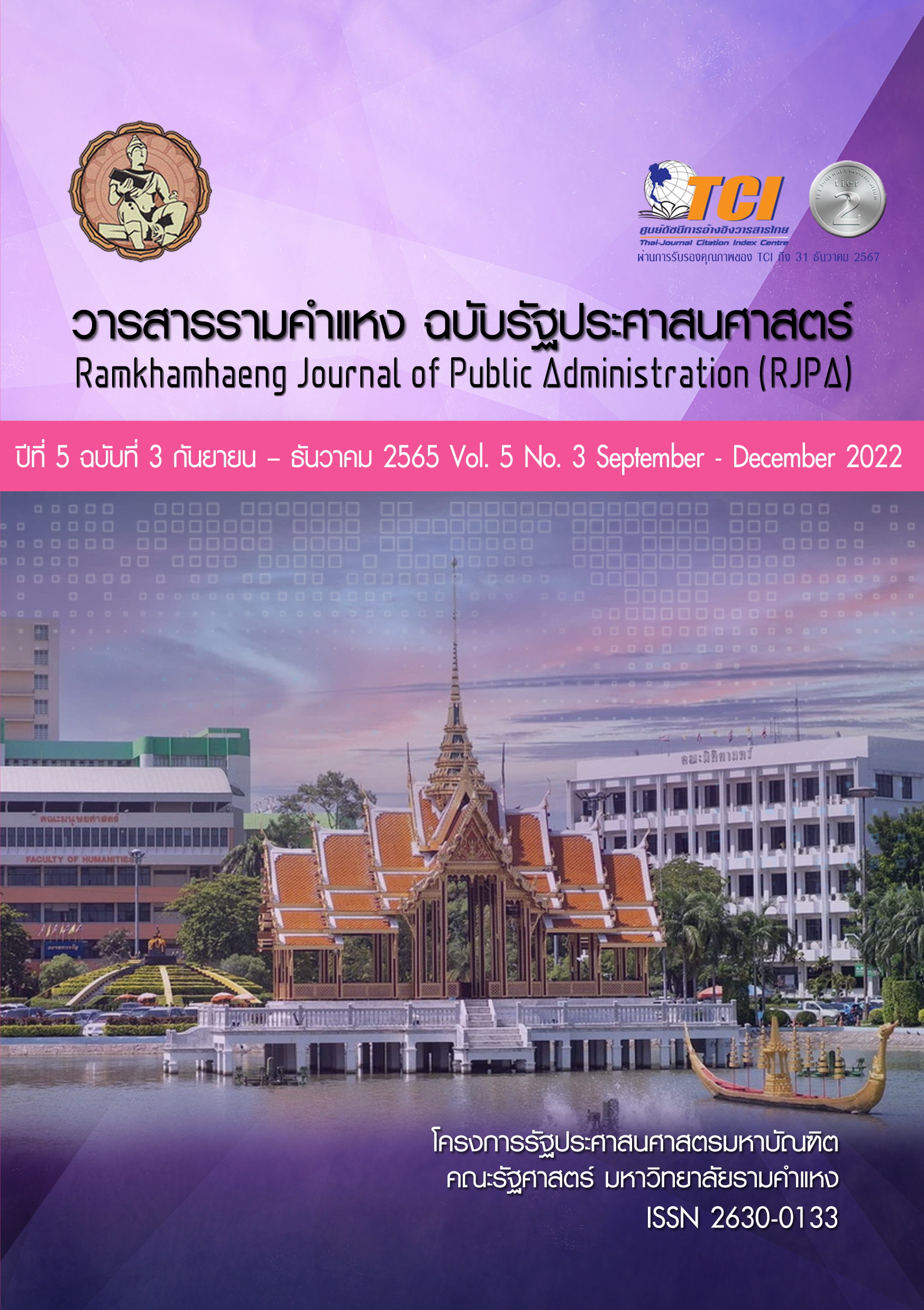Political discourses in Thai Rap songs during the years 2014 - 2020
Keywords:
discourse, politics, Thai Rap songsAbstract
In this paper, the researcher has three objectives, i.e.: (1) to study the contexts of politics, economy, and Thai society during the years 2014 - 2020 affecting artists’ ideas in producing Thai Rap songs; (2) to investigate the discourses in Thai Rap Songs during the period under study; and (3) to examine the contents or lyrics of the Thai Rap songs of Thai Rap artists who wanted to communicate political, economic, and social issues during the years under investigation. The method of qualitative research was conducted with the technique of documentary research. The study focused on the lyrics of twenty-seven Rap songs. The technique of in-depth interview was employed with ten key informants who were Thai Rap artists using the method of purposive sampling.
Findings showed that the contexts of politics, economy, and Thai society during the years 2014 and 2020 consisting of conflicts, social division, economic downturn, and demonstrations by young persons affected the ideas of artists in producing Thai Rap songs. In regard to discourses, artists presented Thai Rap songs through online media. Mini concerts were organized at entertainment venues and demonstration areas. Concerning the song contents, artists presented discourses on political, economic, and social issues. These were the entry of power of the government by coup d'etat, a blame on the justice process, problems of corruption, inequality in society, and others. This is to inform the problems that are happening in society and to propose a call for the government to solve the problems.
References
จรัสพิมพ์ วังเย็น. (2554). แนวคิดหลังสมัยใหม่: การย้อนสู่โลกแห่งภูมิปัญญา.วารสารสถาบันวัฒนธรรมและศิลปะ, (13), 20–23.
จิตวิทยาพัฒนาการวัยรุ่น, ค้นเมื่อ 30 มกราคม 2565, จากhttps//www.baanjomyut.com.
เชาว์วัจน์ พาณิชย์เสรีวิศิษฐ์. (2552). การสื่อสารทางการเมืองผ่านบทเพลงของยืนยง โอภากุล และวงคาราบาว ในช่วงปี พ.ศ. 2524-2552. ดุษฎีนิพนธ์ปรัชญาดุษฎีบัณฑิต, มหาวิทยาลัยเกริก.
ณัฏฐณิชา นันตา. (2553). วาทกรรมเพลงเพื่อชีวิตในบริบทการเมืองไทย (พ.ศ.2525-2550).วิทยานิพนธ์รัฐศาสตรมหาบัณฑิต, จุฬาลงกรณ์มหาวิทยาลัย.
พัด ลวางกูร. (2563). การวิจัยเรื่องความคิดทางการเมืองไทยในนโยบายการพัฒนา. กรุงเทพมหานคร: คณะรัฐศาสตร์ มหาวิทยาลัยรามคำแหง.
เพิ่มศักดิ์ จะเรียมพันธ์. (2564). รัฐศาสตร์ทั่วไป. กรุงเทพมหานคร: สำนักพิมพ์มหาวิทยาลัยรามคำแหง.
โพสต์ทูเดย์. (2563). แฟลชม็อบ “นักเรียน นักศึกษา” แรงต่อเนื่องผนึกพลังเรียกร้องประชาธิปไตยไล่เผด็จการ. ค้นเมื่อ 18 มิถุนายน 2565, จาก https://www .posttoday.com/politic/news/616156
วิภา ปานประชา. (2549). การศึกษาภาพสะท้อนทางสังคมและวัฒนธรรมในวรรณกรรมเพลงลูกทุ่งของสลา คุณวุฒิ. วิทยานิพนธ์ศิลปกรรม ศาสตรมหาบัณฑิต, มหาวิทยาลัยรามคำแหง.
วรพงศ์ ไชยฤกษ์. (2560). วาทกรรมเชิงวิพากษ์: มุมมองใหม่ในการวิจัยทางภาษาไทย. วารสารอินทนิลทักษิณสาร, 8(1), 135-162.
Springnews. (2562). ดังระดับโลก! "ประเทศกูมี" คว้ารางวัล ผู้กล้าหาญคัดค้านความไม่ยุติธรรมที่นอร์เวย์. ค้นเมื่อ 5 กุมภาพันธ์ 2564, จาก https://www.springnews.co.th/ news/ social/ 500449
สุชาติ แสงทอง. (2549). ดนตรีกับการเมืองไทย พ.ศ. 2481-2516. ดุษฎีนิพนธ์ปรัชญาดุษฎีบัณฑิต, มหาวิทยาลัยมหาสารคาม.
สุรชาติ บำรุงสุข. (2562). จาก ‘บทเพลง’ ถึง ‘การเมือง’ 5 ปี ‘ประยุทธ์’ กับ 7 เพลงเพื่อประเทศไทย. ค้นเมื่อ 15 มิถุนายน 2565, จาก https://www.matichon.co.th/news-monitor/news_1326329
สำนักงานคณะกรรมการพัฒนาเศรษฐกิจและสังคมแห่งชาติ. (2560). ยุทธศาสตร์ชาติระยะ 20 ปี. ค้นเมื่อ 20 มิถุนายน 2565, จากhttp://nscr.nesdc.go.th/ ns/
ฮิปฮอปการเมือง. ค้นเมื่อ 16 มีนาคม 2564, จาก https://hmong.in.th/ wiki/ Conscious rap
Barranco, V. S., & Ángeles, T. H. (2013). Discourse analysis inside a song. EDAHI Boletin Cientifico de Siencias Sociales y Humanidades del ICSHu, 2(3), 62-67.
Berelson B. & Steiner. G. A. (1964). Human behavior: Shorter edition. New York: Harcourt, Brace & World.
Colima, L. & Cabezas, D. (2017). Analysis of social Rap as a Political discourse of resistance. Bakhtiniana: Revista de Estudos do Discurso, 12(2), 25-44.
Denzin. N. K. (1978). Sociological methods: A source book. New York: McGraw-Hill.
Fairclough, N. (2010). Critical discourse analysis: The critical study of language. (2nd ed.). New York: Longman.
Risdianto, F. (2016). Discourse analysis of a song lyric entitled “we will not go down”. Register Journal, 9(1), 85-95.
Roskin, M. G., Cord, L. R., Medeiros, J. A., & Walter, S. J. (2000). Political science: An introduction (7th ed.). New York: Pearson.
Street, J. (2014). Music as political communication. Retrieved June 23, 2021, from https://research-portal.uea.ac.uk/en/publications/ music -as-political-communication
Downloads
Published
How to Cite
License
Copyright (c) 2025 ณัฐพัชร์ ศิริวัฒน์, นิพนธ์ โซะเฮง

This work is licensed under a Creative Commons Attribution-NonCommercial-NoDerivatives 4.0 International License.



